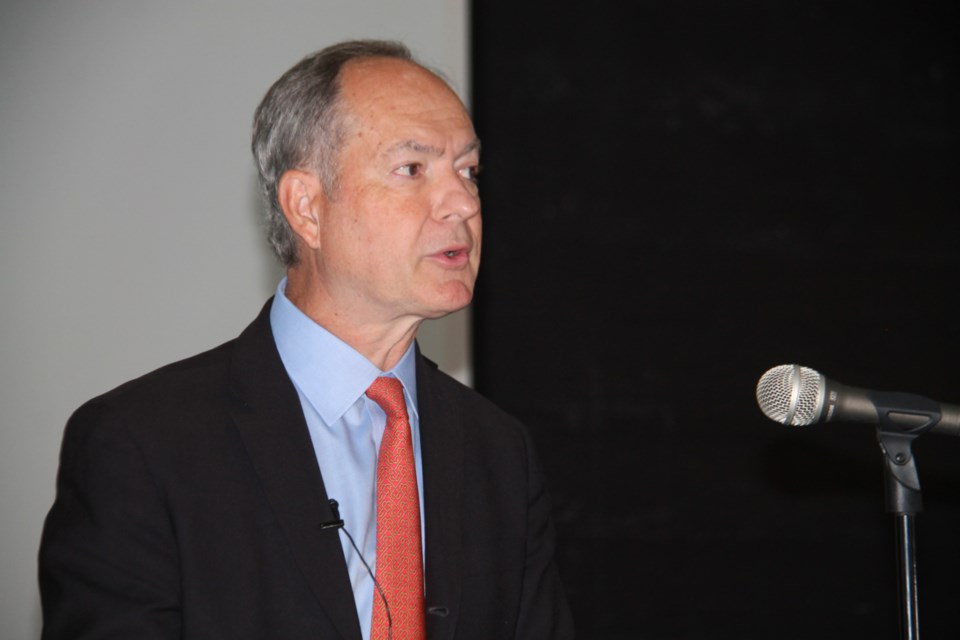Though Ontario government COVID-19 relief spending has been necessary, the province’s deficit and debt has ballooned as a result.
How will that money be paid back?
Peter Bethlenfalvy, Ontario’s finance minister, speaking to a Sault Ste. Marie Chamber of Commerce members’ breakfast at The Machine Shop Thursday morning, said the Ford government has a plan to reduce the deficit and foresees a post-pandemic recovery for the Sault and the province.
Ontario’s debt is the largest of any Canadian province or state in the U.S., estimated to be $440 billion in 2021-22 by The Fraser Institute.
Bethlenfalvy’s provincial government budget, tabled in March, included a projected deficit for the year at $33.1 billion.
“I’ll be doing an update on the first quarter by Aug. 15... at the end of the day, we’ve got to spend money on the health and safety of all Ontarians, but we will get through this pandemic and then the road to economic recovery will be the key to our having sustainable finances in the long term,” Bethlenfalvy said, speaking to SooToday after his speech and a question and answer session with Chamber members.
Much of that recovery, Bethlenfalvy said, will depend on Ontarians’ own resourcefulness in business and industry as well as their willingness to be retrained for new, in- demand careers.
“Ontario’s got incredible, talented individuals, risk takers (in business), many have lived here for many years, some of whom are new to the province, and so our role is to make sure that we foster the conditions for those economic risk takers and job creators, and things like helping in training of skilled labour, providing the labour inputs, the education system, (reducing) the red tape and regulations, the capital investments, the electricity costs,” he told us.
“I’m betting on the people of Ontario. I’m betting on the innovation and ingenuity of every single Ontarian who are risk takers, who are building businesses, and I’m going to continue, with my colleagues’ support, to create the conditions to create those jobs," he told the audience.
“The path forward is not to rely on increased taxes. Businesses and families are already taxed fairly high and I’m not going to target expenditure costs. We look for efficiencies all the time...ways to modernize our public services,” he added.
Bethlenfalvy acknowledged many northern Ontario workers have lost their jobs as a result of the pandemic.
“Since February 2020, employment in northern Ontario has declined by 7.2 per cent, the largest loss across all regions of the province,” he said, addressing the Chamber audience.
Bethlenfalvy, accompanied by Sault MPP and fellow cabinet minister Ross Romano, said the provincial government’s Northern Ontario Recovery Program has helped Sault businesses adapt to public health COVID guidelines and stay afloat, with $1.8 million given to over 100 local businesses.
Bethlenfalvy said Northern Ontario Heritage Fund Corporation (NOHFC) funding, since June 2018, has seen spending of $35 million on over 300 projects in Sault Ste. Marie, leveraging $117 million in investment and creating or sustaining over 700 jobs.
The province will focus on retraining those who have lost their jobs for new careers, he explained, pointing to the example of an automotive sector worker in southern Ontario who has transitioned to a new career as a personal support worker (PSW), those workers needed in areas such as the Sault, with an aging demographic.
The government hopes to see Ontario's deficit, though having dramatically swollen from $8.7 billion in 2019‑20 to $38.5 billion in 2020‑21, decline to a deficit of $27.7 billion in 2022‑23 and $20.2 billion in 2023‑24.
The Ontario tourism and hospitality industry – including major hotels, smaller motels, tourist attractions and community events in Sault Ste. Marie – has taken a beating due to COVID-19 lockdowns and restrictions and a Canada-U.S border only starting to reopen to twice-vaccinated U.S. tourists.
Bethlenfalvy told SooToday “the federal government, of course, should listen to the public health officials and make sure they reopen the borders safely and appropriately... (but) I understand how hard the travel and tourism sector has been hit.”
“So a number of programs, like the Ontario Small Business Support Grant program, helped hunting and fishing lodges, and the Ontario Tourism and Travel Business Support Grant helped the hotels.”
Bethlenfalvy said the province’s $49 million Reconnect Festival and Event Program, announced Wednesday by Minister of Tourism, Culture and Sport Lisa MacLeod, “will provide support for a number of the festivals that we have in this province, many of which are in the north, so regardless of what happens at the border, what we have tried to do is support the travel and tourism industry and the hospitality industry to the point when we can have tourists back in full force in this province.”
Bethlenfalvy, currently visiting northern Ontario communities – including Thunder Bay Wednesday, the Sault Thursday, Timmins and Sudbury Friday – was scheduled to visit OLG, take a tour of Tenaris and Algoma University, and also planned to enjoy lunch at a downtown eatery.
Thursday’s ministerial speech and question and answer session at The Machine Shop was the first indoor event for the Sault Ste. Marie Chamber of Commerce in over a year due to pandemic restrictions on indoor gatherings.
